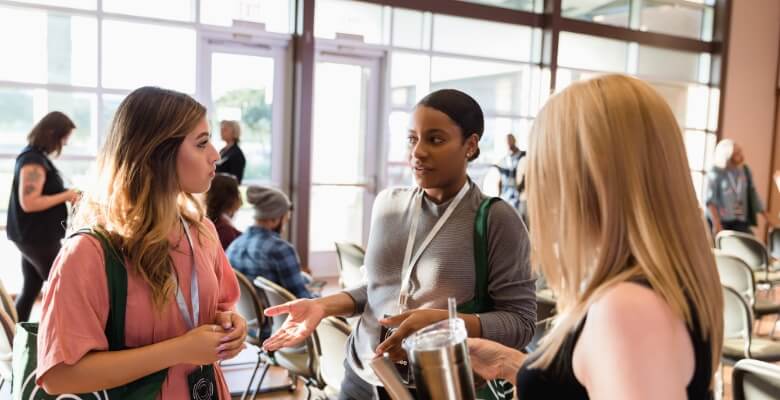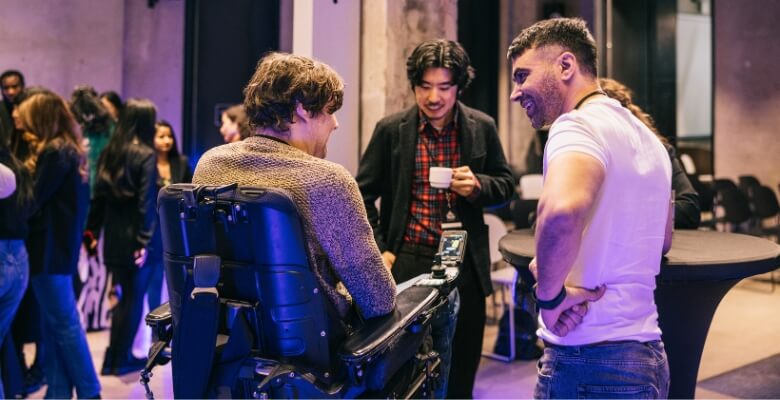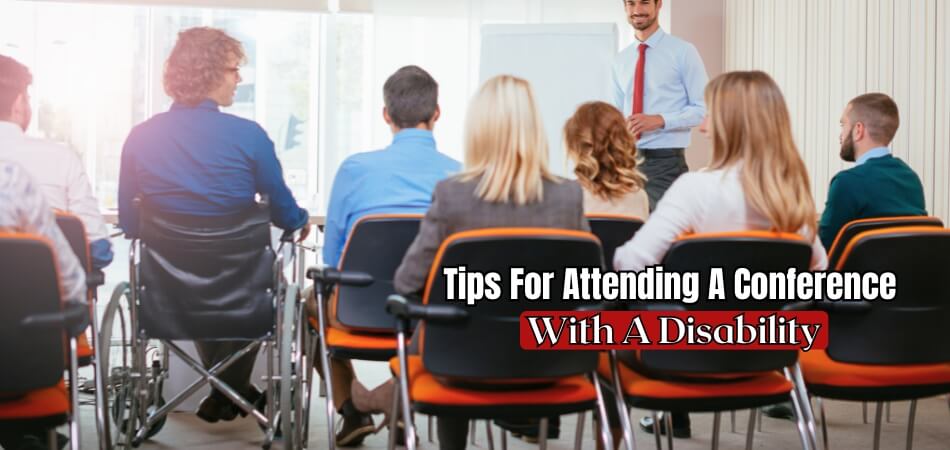As a powerhouse of opportunities, conferences provide invaluable resources for learning, growth, and networking. The opportunities they present can propel your professional and personal development to new heights, presenting you with fresh perspectives and innovative ideas.
Recognizing the importance of inclusivity, these events are increasingly accommodating individuals with disabilities, ensuring that everyone can participate fully and benefit equally. But what are some tips for attending a conference if you have a disability?
Whenever you decide to attend a conference with a disability, it’s crucial to communicate your specific needs to the organizers well in advance and confirm that accommodations like sign language interpreters and accessible seating are available.
Additionally, verify that the venue has the necessary facilities, like ramps and elevators. Stay tuned as we explore these tips deeper and more in the rest of the article.
How is the Environment of a Conference?
The conference environment is energetic and lively, filled with professionals ready to learn and network. Experts from various fields gather to share knowledge, making it a hub of innovation and ideas. The atmosphere is charged with excitement as attendees explore new trends and insights.

When you participate in a global conference from overseas, the experience can be particularly enlightening. This unique opportunity allows you to engage with a variety of cultures and perspectives, enriching your professional journey. Here, everyone brings their unique insights, which enriches the discussions and broadens the learning experience.
Conferences also offer a supportive environment, encouraging collaboration and the exchange of ideas. There are lots of opportunities to dive deep into specific subjects during breakout sessions and workshops. It’s a place where curiosity meets expertise, allowing growth on a personal and professional level.
Who Are Eligible to Attend a Conference?
A conference is an open forum where people gather for discussions, learning, and innovation. They appeal to a wide range of participants, each bringing their unique perspective. Here’s who typically finds themselves eligible to attend these enriching events:
Industry Professionals
Industry professionals seek to stay ahead of trends and developments. They attend to network with peers and gain insights. Conferences provide them with essential industry updates. This develops their skills and professional knowledge.
Students and Academics
Students and academics flourish in a knowledge-rich conference environment. They contribute fresh ideas and perspectives to discussions. Conferences are perfect for them to meet established experts. This exposure aids them greatly in their academic and research pursuits.
Business Leaders
Business leaders look for opportunities to expand and innovate. Conferences introduce them to potential partners and new business strategies. They can explore emerging markets and technologies. This helps them in guiding their companies towards growth and success.
Government Officials and Policy Makers
Government officials attend conferences to gather information about industry dynamics. Their participation helps in crafting informed policies and regulations. Conferences provide them with a platform to communicate with industry leaders. Here, conference attendee engagement is essential for effective policy development.
General Public with Interest
The excitement and curiosity that often accompany the announcement of a conference are contagious, drawing in a wide array of individuals eager to participate. People showing interest in attending a conference add a unique dimension to the event. They bring enthusiasm and diverse perspectives to the discussions, gaining personal knowledge and inspiration. Such engagement at conferences can spark new hobbies or even influence career paths. With each conference, participants from all walks of life are inspired and informed.
Are Disabled People Allowed to Attend Conferences?
Yes, disabled people are allowed to attend conferences. The purpose of these events is to include and make them accessible to everyone interested. Organizers commonly work to ensure that all facilities are accessible. This includes wheelchair ramps, elevators, and accessible restrooms.
Conferences aim to provide an equal environment where everyone can participate fully. They often offer services beyond the basics to accommodate all needs. This approach helps in creating a welcoming atmosphere for attendees with disabilities.
Participation in these events is a reflection of the organization’s commitment to equality and accessibility. It’s essential for increasing the conference experience for all attendees. Everyone gains from the diverse perspectives and contributions that disabled participants bring.
What Are Some Tips for Attending a Conference if You Have a Disability?
There is no doubt that attending a conference can be a rewarding experience, offering a wealth of knowledge and networking opportunities. For those with disabilities, it’s important to ensure these events are accessible and enjoyable. Here are some tips for increasing the conference experience for disabled attendees:
Advance Planning
Organizing your conference in advance is essential for a smooth experience, especially for conference attendees with disabilities. Check the conference materials for accessibility information and reach out to the organizers with any specific needs. This can include requests for sign language interpreters or information on accessible transportation options. Early planning also allows organizers to make the necessary accommodations on time.
Another part of planning involves reviewing the event schedule. Identify the sessions that interest you and note their locations. This will help you plan your movements and ensure you can make your way between venues comfortably and efficiently.
Communication with Organizers
Open communication with conference organizers is key. Inform them about your specific accessibility requirements well in advance of the event. This allows them to arrange everything you need to participate fully. Trustworthy conference organizers will ensure that your needs are met and may even check in during the event to see if everything is going smoothly.
Also, ask organizers for written materials in accessible formats. This could be anything from schedules to presentations, enabling you to prepare better. Access to these materials in advance can greatly improve your experience, ensuring you are not disadvantaged.
Utilizing Technology
Many conferences now incorporate technology that aids disabled attendees. Find out if the event offers any special navigation apps or schedules designed for better accessibility. These tools can make a significant difference in how you experience the event.
Moreover, technology such as hearing loops for attendees with hearing impairments or visual aids for those with vision disabilities can be invaluable. Make sure these technologies are available when you arrive, and reserve them if necessary.
Accommodations and Facilities
Ensure that the venue is equipped with accessible facilities. This includes ramps, elevators, accessible restrooms, and designated seating areas. These facilities should be clearly marked and easy to access.
It’s also wise to check the venue layout before the event. Being familiar with the layout can help you find your way more easily, reducing unnecessary stress or physical strain during the event.
Networking and Assistance
As a final point, don’t overlook the power of networking. Connect with other attendees who may have similar experiences or can share their own tips. They can offer practical advice and support throughout the conference.
If you need assistance, don’t hesitate to ask. Most conferences will have volunteers to help attendees. Utilizing this help can help you focus more on the event content and less on logistics.
By following these tips, attendees with disabilities can enjoy a fully accessible and enriching conference experience.
Best Ways to Managing Fatigue and Staying Comfortable
Managing fatigue and staying comfortable at conferences is crucial for a productive experience. Long hours and busy schedules can lead to exhaustion if not properly managed. Here are some effective strategies to ensure your comfort and energy levels remain high throughout the event:
- Stay Hydrated: Drink plenty of water to maintain hydration levels during the conference. Proper hydration increases focus, reduces fatigue and supports overall well-being.
- Take Breaks Regularly: Schedule short breaks to step away from sessions and recharge. Brief pauses allow your mind to rest, helping maintain productivity throughout the day.
- Prioritize Comfortable Attire: Choose clothing that is comfortable and suitable for long hours of sitting or standing. Well-fitted shoes can prevent discomfort and improve mobility at the venue.
- Plan Your Schedule Wisely: Review the conference agenda in advance and prioritize sessions of interest. Balancing sessions with breaks allows for a more enjoyable experience without overwhelming yourself.
- Incorporate Light Snacks: Keep healthy snacks on hand to sustain energy levels throughout the day. Eating small portions helps avoid energy crashes and keeps your metabolism steady.
- Utilize Ergonomic Tools: Take advantage of ergonomic seating options if available, or use portable cushions for added comfort. Supporting your posture can alleviate discomfort and improve focus during presentations.
- Engage in Light Movement: Take short walks or stretches during breaks to reduce stiffness and increase circulation. Physical activity can refresh your mind, making it one of the best ways to stay healthy at conferences. Incorporating movement into your day helps maintain energy levels, allowing you to stay focused and engaged throughout the event.
Frequently Asked Questions
Listed below are some FAQs and their relevant answers to help you grasp what are some tips for attending a conference if you have a disability:
How Can I Participate in Networking Opportunities if I Have Social Anxiety or Communication Difficulties?
Seek out quieter networking areas or request assistance from event staff to facilitate introductions in smaller groups.
What if I Encounter Accessibility Barriers During the Conference?
Immediately notify event staff or volunteers about any barriers you encounter. They can work to address the issue promptly and ensure your continued participation.
Is There a Designated Area for Attendees with Disabilities to Park or Drop Off?
Many conferences offer accessible parking spaces or drop-off points. Check with the organizers for specific arrangements at the venue.
What if I Need to Take Frequent Breaks Due to My Disability?
Communicate your needs to the organizers. They can suggest quiet rest areas or make arrangements for you to exit and re-enter sessions as needed.
How Do I Handle Dietary Restrictions or Medical Needs During Meal Times?
Provide details of your dietary requirements when registering for the conference. The catering team can then accommodate your needs.
What Are the Best Activities for Disabled People?
The best activities depend on individual interests and abilities, but options like adaptive sports, art classes, or accessible outdoor excursions can be enjoyable and fulfilling. Research local organizations or community centers that offer inclusive programs.
Bottom Line
An enriching conference experience for attendees with disabilities requires thoughtful preparation and active engagement. Accessibility is largely determined by advance planning of the visit and open communication with the organizers.
The query “What are some tips for attaining a conference if you have a disability?” highlights the importance of accessible facilities and technological aids that promote participation. Networking with fellow attendees also plays a crucial role, offering support and sharing experiences.
The adoption of these practices can transform conferences into platforms where knowledge, innovation, and connections can flourish for everyone, regardless of physical ability. This approach not only increases the experience but also celebrates uniqueness in professional environments.







